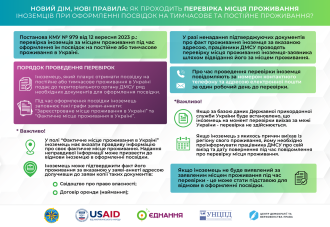Mariia Poloz
Lawyer in the field of development and support of civil society organizations,
Ukraine Civil Society Sectoral Support Activity Project
On October 2, the new Methodology for Determining the Ultimate Beneficial Owner by a Legal Entity, approved by the Resolution of the Cabinet of Ministers of Ukraine and the National Bank of Ukraine dated September 19, 2023, was officially published – and thus came into force. No. 1011.
What does it change for civil society organizations (CSOs)?
When in 2021 there was a fuss about the new obligation of legal entities to provide information on the presence or absence of the ultimate beneficial owner (UBO) to be put on in the Unified State Register of Legal Entities, Individual Entrepreneurs and Public Organizations (USR), it was not a problem for profit-making organizations – the UBO was mainly determined by the size of the share in the authorized capital. But for CSOs-legal entities, which have neither authorized capital nor owners, everything was a bit more complicated. As a result, a large part of CSOs entered information about the absence of a UBO. The new Methodology offers a different approach.
What approach does the new methodology offer?
It should be noted at the outset that the Methodology does not rule out the situation where CSOs or other legal entities do not have a UBO. Although there is no such option in the FATF recommendations, which the legislation of Ukraine as an EU candidate should comply with.
However, the Methodology takes into account the FATF recommendations on UBOs for CSOs and recommends defining them on the basis of direct or indirect (through related individuals or legal entities) decisive influence of an individual on the activities of such a non-profit organization. This refers to the right to control, use or dispose of all assets or shares thereof, the right to decisively influence the composition, voting results of the management bodies, as well as the execution of transactions and making binding decisions that have a decisive influence on the activities of the non-profit organization (paragraph 34 of the Methodology).
If there are no signs defined in paragraph 34 of the Methodology and there is no doubt as to whether the identified person is the ultimate beneficial owner, it is recommended to investigate information on persons holding positions in the management of the organization and having the right to represent the organization without a power of attorney.
Why is this approach logical?
The purpose of determining UBO (regardless of the type of legal entity or approaches) is to identify people who can influence the flow of an organization’s finances and the fate of its assets. This information is needed to determine the level of threat (or lack thereof) that finances and property will be used for money laundering or terrorist financing.
Of course, the legislator has established a number of exceptions to the obligation to establish the presence or absence of UBOs of legal entities (you can find them in Part 8 of Article 5-1 of the Law of Ukraine on Prevention and Counteraction of the Legalization (Laundering) of the Proceeds from Crime, Financing of Terrorism and Financing of the Proliferation of Weapons of Mass Destruction). Unfortunately, public associations (PAs) and charitable organizations (COs) were not included in this list. And if we recall that the last two National Risk Assessments identified Ukrainian PAs and COs as high risk clients for money laundering and terrorist financing, it is unlikely that they will be allowed not to report on the UBOs in the near future.
How to determine UBOs for PAs and COs? Basic provisions
Ukrainian legislation gives PAs and COs a wide range of opportunities to choose their governance and decision-making structure. Therefore, there is no one-size-fits-all solution, but it is possible to outline the basic framework.
First, it should be remembered that a UBO is always a natural person. A collective body (e.g., a general meeting of an organization) cannot be a UBO.
Should members of a general meeting of an organization be considered to be a UBO? No, because a mere member of the meeting cannot dispose of the property and finances of the organization or determine the direction of its activities. It is the body that must make the decision.
So your next step is to study the articles of association of the organization (and other documents, if there are any), which govern the CSO’s activities and its finances. And determine whether there is a person in the organization who can dispose of the organization’s property and finances or part thereof, form governing bodies and determine the directions of its activities.
If such a person or persons exist, they should be defined as UBOs. If there are no such individuals, and all decisions on finances, property and activities of the organization are made collectively only, it can be concluded that there is no UBO.
Why should the methodology recommendations be considered?
The Methodology is primarily intended for legal entities (including CSOs), which should independently determine whether or not they have a UBO. However, in practice, it will also be used by primary reporting entities (PREs) when they perform due diligence on their clients. For CSOs, this is primarily banks, which have previously been able to suspend an organization’s services if they believe that the information provided by the CSO on UBO or ownership structure is incorrect or incomplete.
In effect, this meant blocking the organizations’ accounts. And starting from December 1, when the Order of the Ministry of Justice of Ukraine dd. 07/12/2023 No. 2542/5 “On the approval of the procedure for notification of the owner of the Unified State Register of Legal Entities, Individual Entrepreneurs and Public Organizations on discrepancies between the information on ultimate beneficial owners and/or the ownership structure of the legal entity received by the primary reporting entity as a result of due diligence and posted in the Unified State Register of Legal Entities, Individual Entrepreneurs and Public Organizations” comes into force, PREs will have new duties. They will have to report on discrepancies between the information on UBOs and the ownership structure of their clients as indicated in the Unified State Register and that held by the PREs. In particular, they found it themselves and qualified it as information on UBOs.
What does it mean?
For example, the AoA of an organization states that the head of the organization has the right to dispose of the organization’s property. In accordance with paragraph 34 of the Methodology, this means that the head has the right to decisive influence on the activities of a non-profit organization, disposing of all assets or share thereof and therefore should be considered the organization’s UBO.
At the same time, the organization has reported that it does not have a UBO, and this information is available in the Unified State Register. The bank that serves the CSO will detect this discrepancy during the audit and will be obliged to report it to the Ministry of Justice of Ukraine.
The Ministry of Justice in turn will pass the information on to the state registrar, which will be obliged to make a note in the Unified State Register about the possible inaccuracy of information on the UBO of this CSO. Of course, the CSO will provide explanations to the state registrar’s request and will probably make changes to the Unified State Register. But until this happens, the organization is likely to remain unbanked: a bank is not allowed to provide services without establishing the client’s UBOs and ownership structure. This means a potential blockade of operational activities for such CSOs.
So what do we do?
First of all, don’t panic. Examine your organization’s documents and see what they say about your organization’s UBOs in the USR. Think about whether there are people in your organization who have a decisive influence on your organization’s assets, finances, and what your organization does. If there are such people and they have already been designated as UBOs in the USR, everything is fine.
Even then, however, we suggest contacting your bank to see if their opinion of your UBOs will change as of December 1 (and if the bank has any questions about your UBOs and the USR).
If you find out that your CSO has individuals with decisive influence, but the USR says that there is no UBO, we recommend that you amend the UBO information in the USR and notify your bank.
On the positive side, it is most likely that such a UBO will be the head of the organization, information about whom is already publicly available in the Unified State Register, and you will not have to additionally disclose information about other members of the organization.
What will the UBO status mean for an individual?
For an individual, the UBO status will mean that there is publicly available data about the person in the Unified State Register, i.e. last name, first name, patronymic and registration address. Other personal data – passport data and taxpayer identification code – will have to be provided to the state registrar, but they will not be publicly available. Full identification data will also have to be provided to the bank or other PREs upon their request for verification.
This material was prepared as part of the Project Ukraine Civil Society Sectoral Support Activity implemented by the Initiative Center to Support Social Action “Ednannia” in partnership with the Ukrainian Center for Independent Political Research (UCIPR) and Centre for Democracy and Rule of Law (CEDEM) with the sincere support of the American people through United States Agency for International Development.



